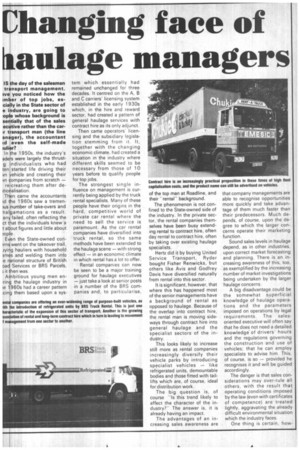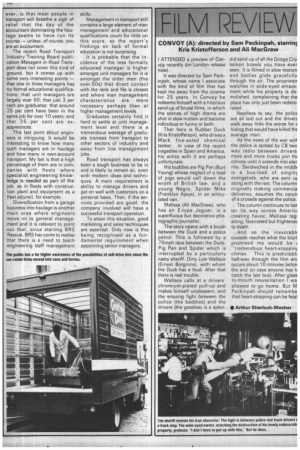Changing face of hraulage managers
Page 67

Page 68

If you've noticed an error in this article please click here to report it so we can fix it.
IS the day of the salesman transport management. we you noticed how the anber of top jobs, escially in the State sector of e industry, are going to ople whose background is sentially that of the sales ecutive rather than the car1 transport man (the line anager), the accountant id even the self-made iulier?
In the 1950s, the industry's ade's were largely the thrust ndividualists who had ten started life driving their vn vehicle and creating their vn companies from scratch — re-creating them after deitionalisation.
Then came the accountants id the 1960s saw a tremen)us number of take-overs and nalgamations as a result. any failed, often reflecting the ct tlat the individuals knew a t aLout figures and little about 3op e Even the State-owned con'ms went on the takeover trail, iyirg hauliers with household 3mes and welding them into le national structure of British oad Services or BRS Parcels, ; it then was.
Ambitious young men enTing the haulage industry in le 1960s had a career pattern cing them based upon a sys
tem which essentially had remained unchanged for three decades. It centred on the A, B and C carriers" licensing system established in the early 1930s which, in the hire and reward sector, had created a pattern of general haulage services with contract hire as its only adjunct.
Then came operators' licensing and the subsidiary legislation stemming from it. It, together with the changing economic climate, had created a situation in the industry where different skills seemed to be necessary from those of 10 years before to qualify people for top jobs.
The strongest single influence on management is currently being applied by the truck rental specialists. Many of these people have their origins in the hard, competitive world of private car rental where the need to sell the service is paramount. As the car rental companies have diversified into truck rental, so the same methods have been extended to the haulage scene — with strong effect — in an economic climate in which rental has a lot to offer.
Rental companies can now be seen to be a major training ground for haulage executives — just take a look at senior posts in a number of the BRS companies and, to particularise,
of the top man at Roadline, and their -rentalbackground.
The phenomenon is not confined to the State-owned side of the industry. In the private sector, the rental companies themselves have been busy extending rental to contract hire, often day rental to contract hire, often by taking over existing haulage specialists.
Hertz did it by buying United Service Transport, Ryder bought Fisher Renwicks, but others like Avis and Godfrey Davis have diversified naturally from rental into this sector.
It is significant, however, that where this has happened most of the senior managements have a background of rental as opposed to haulage. Because of the overlap into contract hire, the rental man is moving sideways through contract hire into general haulage and the specialist sectors of the industry.
This looks likely to increase still more as rental companies increasingly diversify their vehicle parks by introducing specialist vehicles — like refrigerated units, demountable bodies and those fitted with taillifts which are, of course, ideal for distribution work.
The big question is, of course "Is this trend likely to affect the character of the industry?'" The answer is, it is already having an impact.
The advantages of an increasing sales awareness are that company managements are able to recognise opportunities more quickly and take advantage of them much faster than their predecessors. Much depends, of course, upon the degree to which the larger concerns operate their marketing function.
Sound sales levels in haulage depend, as in other industries, upon correct market forecasting and planning. There is an increasing awareness of this, too, as exemplified by the increasing number of market investigations being undertaken by the larger haulage concerns.
A big disadvantage could be the somewhat superficial knowledge of haulage operations and the parameters imposed on operations by legal requirements. The salesoriented executive will often say that he does not need a detailed knowledge of drivers' hours and the regulations governing the construction and use of vehicles; that he can employ specialists to advise him. This, of course, is so — provided he recognises it and will be guided accordingly.
The danger is that sales considerations may over-rule all others, with the result that operating conditions imposed by the law (even with certificates of competence) are treated lightly, aggravating the already difficult environmental situation which the industry faces.
One thing is certain, how ever, is that most people in transport will breathe a sigh of relief that the day of the accountant dominating the haulage seems to have run its course — unless, of course, you are an accountant.
The recent Road Transport Industry Training Board publication Managers in Road Transport does not cover this kind of ground, but it comes up with some very interesting points — that one in three managers has no formal educational qualifications; that unit managers are largely over 50; that just 3 per cent are graduates; that around 25 per cent have been in the same job for over 10 years; and that 35 per cent are exapprentices.
This last point about engineers is intriguing. It would be interesting to know how many such managers are in haulage and how many in own-account transport. My bet is that a high percentage of them are in companies with fleets where specialist engineering knowledge is needed as part of the job; as in fleets with construction plant and equipment as a fleet adjunct, for example.
Diversification from a garage business into haulage is another main area where engineers move on to general management and it is relevant to point out that, since starting BRS Rescue, BRS has come to realise that there is a need to teach engineering staff management skills.
Management in transport still contains a large element of man management and educational qualifications count for little on this score, so the report's findings on lack of formal education is not surprising.
It is probable that the incidence-of the less formally educated manager is higher amongst unit managers for it is amongst the older men (the over-50s) that direct contact with the rank and file is closest and where man management characteristics are more necessary perhaps than at higher management levels.
Graduates certainly find it hard to settle at unit management level and there is a tremendous wastage of graduate trainees from transport to other sectors of industry and away from line management jobs.
Road transport has always been a tough business to be in and is likely to remain so, even with modern ideas and techniques. A main requirement is ability to manage drivers and get on well with customers on a personal basis. Then, if the services provided are good, the company involved will have a successful transport operation.
To attain this situation, good marketing and sales techniques are essential. Only now is this being recognised as a fundamental requirement when appointing senior managers_
























































































































